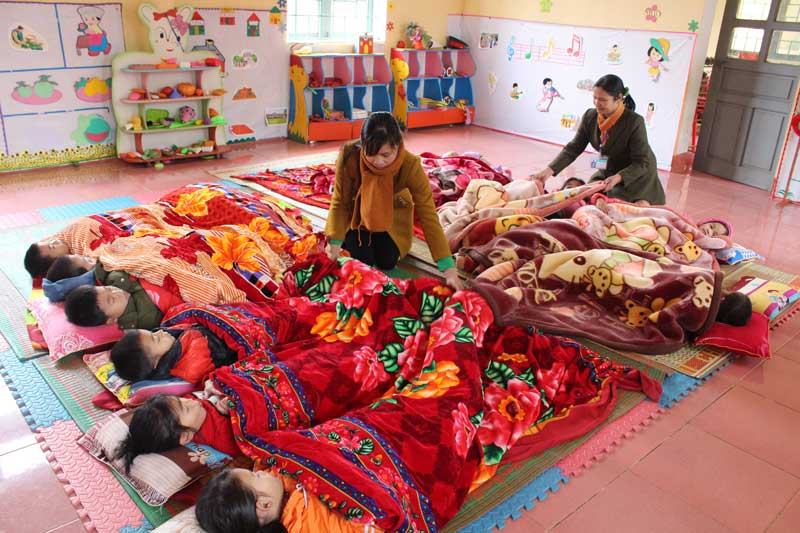



The work of anti-cold, keeping pupils warm is
always being taken care by the teachers of Ngoc Son Nursery School (Lac Son).
Pulling the blankets gently to cover the
children, the elite teacher Bui Thi Lon, Head of Ngoc Son Nursery School (Ngoc
Son commune) shared: The school has 317 children from 13 months to 72 months.
Besides the main school campus, the school has three separate campuses in
remote villages. Due to the high altitude of mountainous areas, in the cold
season, the temperature in Ngoc Son is often low, with fog and cold, especially
in the early morning. Prior to that situation, the school has made official
directives of the Department, District Education and Training Board on the prevention
of the cold for pupils. Accordingly, when the temperature falls below 10
degrees Celsius, the school will inform the student to stay at home. When the
weather changes, the temperature is low, the school propagates for parents to
ensure full of warm clothes, towels, socks when taking or picking up the
children for not letting them be cold. As a result, in recent cold periods,
school pupils' health is assured. The attendance rate in the cold days was 98%,
and in the extremely cold days remained at over 60%.
Besides the active propaganda for parents to
take measures to keep children warm when going to school, to ensure the health
of children, in the cold weather, there is dense fog, the school organizes to
pick up the children later than usual. Due to the characteristics of children
groups are semi-boarding school, in recent time, in addition to the support of
parents, the school also saved the regular expenditures and advocated
departments, organizations to support for buying mattresses and warm blankets
for pupils. Along with that, the school ensures enough warm water for children
to drink and sanitize the body. Their education also limits the outdoor
activities to keep their health.
Mr. Bui Van Danh, Head of the Education and
Training Board of Lac Son District, said: Currently, in the district, there are
78 schools with more than 1,000 classrooms and over 200 campuses, of which 30
are preschools. The total number of pupils in the whole district is over
31,000. It is worth saying that more than half of the mountainous communes have
difficulties in the economic conditions, terrain and transport roads. Whenever
the weather is cold, these communes have lower temperature than those communes
in the lower areas. Therefore, when the temperature is low, pupils in
mountainous communes are directly affected. In the recent cold periods, many
schools in highland communes such as Ngoc Son, Ngoc Lau, Tu Do, Mien Doi had to
base on the actual conditions to let pupils leave school.
In addition, mountainous localities of which
socio-economic conditions are still very difficult, many pupils come to school
wearing thin clothes, not enough warm, therefore, in the program of supporting
warm clothes, the District Education and Training Board has introduced these
localities for warmth support for the children. In parallel with that, the
Board has advised the District People's Committee to arrange funding sources to
repair and upgrade the system of material facilities in the school for safety.
Accordingly, in 2017, the District People's Committee invested 40 billion dongs
to upgrade hundreds of classrooms. Up to now, many classrooms have been
equipped with windshields, electric and light systems for pupils to study
during the cold weather.